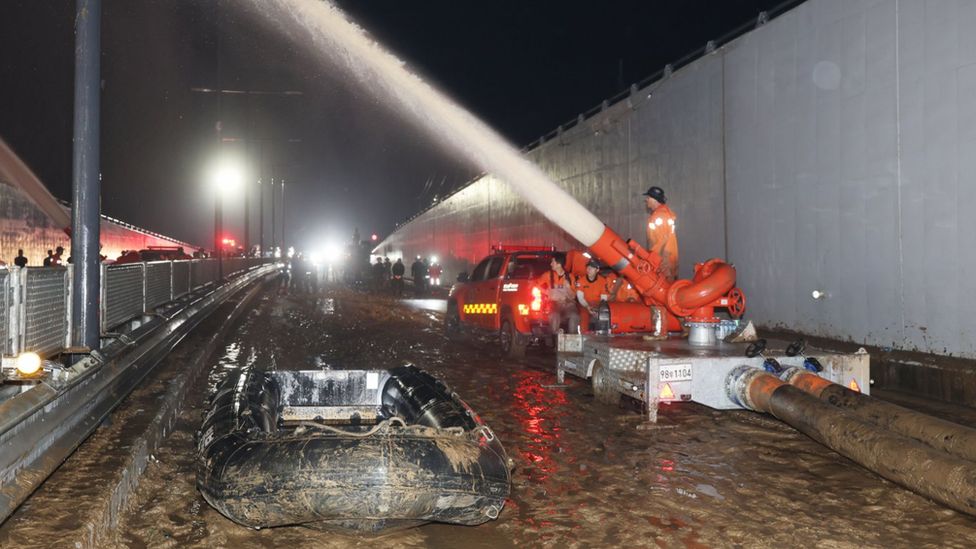



Crews have been pumping the water out of the flooded tunnel in a desperate rescue mission
On Saturday night, flood water from a burst river bank poured into the underpass, quickly trapping people in their cars and commuters on a bus.
Officials are yet to disclose how many got stuck in the 685m (2,247ft) tunnel, but said there were 15 vehicles.
At least 39 people have died in torrential rains the past week.
South Korea has been hit by extreme rainfall which caused floods, landslides and power cuts.
As of Monday morning, at least nine people were still missing after a weekend deluge, authorities said.
In the suburb of Osong, where the tunnel flooded, several of the bodies were recovered from inside a bus. Nine survivors were rescued on Saturday.
The victims' families say the deaths might have been prevented had the local authorities responded effectively.
Several local media outlets reported that a few hours before the tragedy, the river flood control office had issued a warning about the alarming water levels, and therefore the traffic around the tunnel area should have been diverted.
Most of the other fatalities were in the mountainous North Gyeongsang region, where landslides swept away whole houses.
Almost 300mm (11.8in) of rain is reported to have fallen across South Korea on Saturday.
The country typically sees 1,000mm (39.4in) to 1,800mm (70.9in) a year, according to the Korean Meteorological Association - although much of that does fall during the summer months.
Aerial pictures from flood-affected areas show brown mud and flood waters so deep, only the tops of roofs can been seen sticking out.
Thousands of people have been affected by evacuation orders issued by various local governments and Prime Minister Han Duck-soo has asked the military to help with the rescue efforts.
Early on Saturday morning local time, some 6,400 residents were evacuated after the Goesan Dam, also in North Chungcheong, began to overflow, the agency said.
A number of low-lying villages near the dam as well as many of the roads connecting them were submerged, leaving some residents trapped in their homes.
Late on Friday, a landslide caused a train to derail in North Chungcheong. One engineer was injured, but the train was not carrying passengers at the time.
Korail, the country's national rail operator, has announced the suspension of all slow trains and some bullet trains, and said other bullet services would be disrupted.
The Korea Meteorological Administration forecast more rainfall through to Wednesday next week. It warned that the weather conditions pose a "grave" danger.
Extreme rain has caused floods and landslides across several countries - including India, China and Japan - over the past fortnight.
While many factors contribute to flooding, scientists say a warming atmosphere caused by climate change makes extreme rainfall more likely.
The warmer it becomes, the more moisture the atmosphere can hold, resulting in more droplets and heavier rainfall, sometimes in a shorter space of time and over a smaller area.
-- Courtesy of BBC News